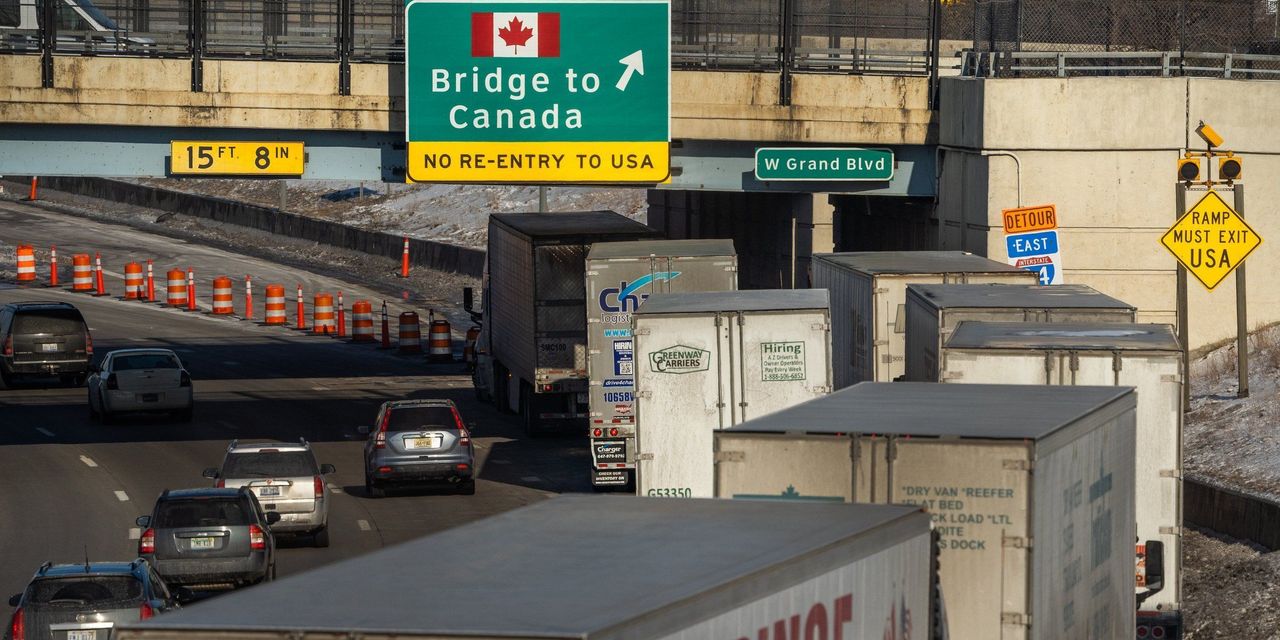
Canadian and U.S. officials expressed concerns Wednesday on the possible fallout from a prolonged traffic disruption at Detroit’s Ambassador Bridge on already strained supply-chain networks.
On Monday, the bridge was temporarily closed by a blockade set up by protesters fighting Covid-19 vaccine mandates. Some of those protesting said they were inspired to act by a demonstration in Ottawa, which for the past 13 days has clogged traffic in the Canadian capital’s core district and disrupted residents’ lives.
The bridge has been partially re-opened, with vehicles able to travel from Windsor, Ontario, to Detroit, but at sharply reduced traffic levels. Meanwhile, U.S. trucks and other vehicles cannot enter Canada via the Ambassador Bridge, which crosses the Detroit River and carries roughly 30% of two-way annual U.S.-Canada trade.
The latest U.S. trade data pegs annual trade between the North American neighbors at over $600 billion.
Commercial traffic has been rerouted north to the Blue Water Bridge, which crosses the St. Clair River and connects Port Huron, Mich., with Sarnia, Ontario, roughly 66 miles north of the Detroit-Windsor crossing.
By late Wednesday, trucks were backed up more than 17 miles on Michigan highways leading to that bridge, a spokeswoman for the Michigan Department of Transportation said, adding that it was taking truckers up to five hours to cross the Blue Water Bridge.
“If there were to be prolonged blockages at key entry points into Canada that could start to have a measurable impact on economic activity in Canada,” Tiff Macklem, governor of the Bank of Canada, said at a press conference. “Most truckers are trying to get goods into and out of Canada quickly. We’ve already got a strained global supply chain. We don’t need this.”
White House press secretary Jen Psaki said the Biden administration is closely monitoring the situation and is in touch with Canadian officials. Dr. Elizabeth Sherwood-Randall, the deputy national security adviser, convened a meeting on it today, Ms. Psaki said.
“We are watching this very closely,” she said, calling the blockade a risk to logistics networks, particularly the movement of goods and parts for auto production. “We’re working to ensure there’s movement.”
According to the Canadian Vehicle Manufacturers’ Association, there were over 2.2 million truck crossings on the Ambassador Bridge in 2020, and a sizable chunk of those were tied to auto manufacturing. U.S. Commerce Department trade data estimates Canada imported $44 billion worth of auto-related goods last year from the U.S.
Canadian officials say the disruption at the Ambassador Bridge is illegal, and urged demonstrators there to go home.
Drew Dilkens, the mayor of Windsor, said he has formally requested additional law-enforcement personnel from the federal government and the province of Ontario to deal with the protest in the capital city.
“While we are hopeful the situation can be resolved in the short term, we need to plan for a protracted protest,” he said. “While it may be gratifying for some to see the forceful removal of the demonstrators, such action may inflame the situation and certainly cause more folks to come here and add to the protest. We don’t want to risk additional conflict.”
—Alex Leary contributed to this article.
Write to Paul Vieira at [email protected] and Jacquie McNish at [email protected]
Copyright ©2022 Dow Jones & Company, Inc. All Rights Reserved. 87990cbe856818d5eddac44c7b1cdeb8








